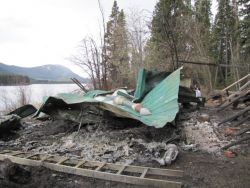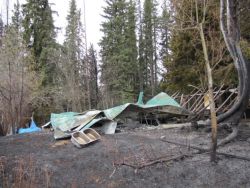NEWS RELEASE posted on May 29, 2010 by dawn
Arson on a Wet’suwet’en Cabin
This act of violence is not the first of its kind
Poplar Lake, BC: In a spineless act, a cabin belonging to the ‘Unist’ot’en people was deliberately burned to the ground sometime on May 8, 2010. Although initially devastated by the cowardly burning, the ‘Unist’ot’en chiefs and membership have used the incident to galvanize their resolve to protect the integrity of their jurisdiction, authority, and their territories from intensified industrial exploitation and further threats of ecological destruction.
“Our ‘Unist’ot’en members will not sway under the threats and actions of industry and government. My grandmother Christine Holland gave us specific directions to protect our lands – that is exactly what we intend to do,” says hereditary chief Knedebeas - Warner William. The ‘Unist’ot’en Clan Chiefs will continue to exercise their legitimate authority and jurisdiction over their ancestral lands, waters, and membership.
The burning of a cabin at the Poplar Lake site is not an isolated incident. A previous Wet’suwet’en cabin, with all of its contents, which stood at the same site was burned in 1987 by government officials from the BC Parks Branch. An attempt, by the ‘Unist’ot’en members to rebuild the cabin in the 1980’s was bulldozed to make way for a Ministry of Forests Recreation Park. These civil servants were accustomed to burning and destroying Wet’suwet’en cabins in a meager attempt to remove the Wet’suwet’en occupants from exercising their inherent Aboriginal Rights. Other Wet’suwet’en cabins were destroyed by civil servants at countless other locations such as the Lower Parrot Lakes in 2004 and the Gosnell Creek/Morice River in the late 1970’s to name only two of many recent acts of violence, out of many, against Wet’suwet’en homeplaces. During the times of the Indian Claims Commission between 1875 and 1920 countless Wet’suwet’en homes and ranches were burned to the ground as the occupants were forced to move onto Federal Government Indian Reservations. There was never a formal apology or compensation for these cowardly acts of violence and disrespect. As a result, relationships between government agencies and the Wet’suwet’en people have always been strained.
The site at Poplar Lake was used by the ‘Unist’ot’en people for many millennia. The remains of an older cabin are still visible opposite from the shores from the most recent cabin site – a cabin that was lived in all year round by the previous Knedebeas (the late Christine Holland) and her late husband Jim Holland. Shortly after her husband Jim died at the old cabin site, Christine moved away from Poplar Lake and into the nearby community of Houston. Christine raised her children who all settled predominantly in the communities of Houston, Moricetown, and Prince George.
The cabin that burned to the ground was fully equipped with emergency food rations, cooking utensils, a propane cook stove, a wood stove, bedding, tarpaulin, camp tools, and extra warm clothes in the event that anybody needed to use the place in an emergency. Many Children and Youth Cultural Camps were hosted at the cabin site. Adult and Family Camps were frequent at the site. Last fall a “Marginalized Men’s Camp” was hosted by the ‘Unist’ot’en and facilitated by the Dzel Kant Friendship Center. School Camps and Cross Cultural seminars were hosted at the site for many groups. The loss of the cabin is not only felt by many ‘Unist’oten members but is felt by many non-Wet’suwet’en community members as well.
The ‘Unist’ot’en Clan will continue with plans to protect their lands from degradation and exploitation. The over harvesting of timber, cattle grazing, mining activities, and the proposed natural gas and oil pipelines will be prohibited from breaching ‘Unist’ot’en laws and trespassing on their territories without meaningful consultation. Industry and government are expected to comply with protecting ‘Unist’ot’en Section 35(1) rights and exercising “Free, Prior, and Informed Consent” when dealing with ‘Unist’ot’en territories and membership.
Freda Huson the ‘Unist’ot’en spokesperson states, “We believe that the coward(s) who were responsible for the burning of our cabin will be identified by the good, responsible, and helpful residents of Houston and eventually convicted in the court of law. Despite feeling the initial rage, hurt, and tremendous sadness, we will confidently rise to the occasion and rebuild what was lost. Unfortunately, struggling for survival and overcoming tragedies like this is something that our people have become very good at”.
For more information contact:
Freda Huson, spokesperson for the ‘Unist’ot’en people in the C’ilhts’ekhyu Clan. Any communication regarding ‘Unist’ot’en business will be brought to the attention of the new ‘Unist’ot’en company called Tse Wedi ‘Elh at: (778) 210-1100 or nfhuson@moricetown.ca
The site for the Vancouver local of The Media Co-op has been archived and will no longer be updated. Please visit the main Media Co-op website to learn more about the organization.

